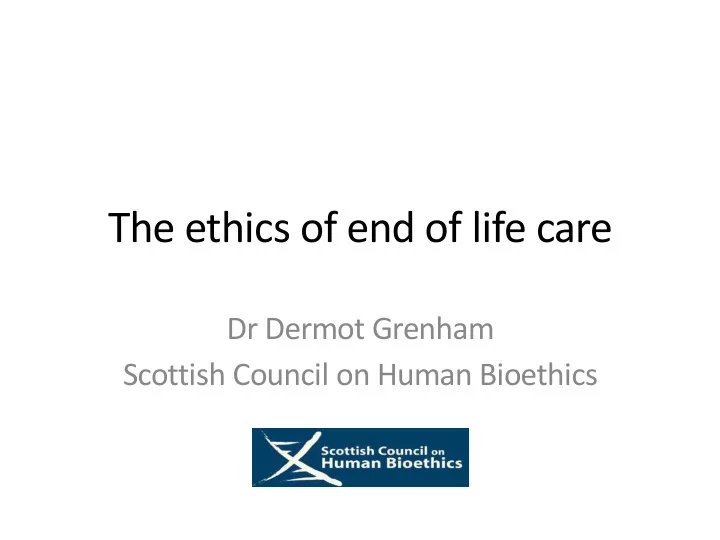

The ethics of end of life care Dr Dermot Grenham Scottish Council on Human Bioethics
Agenda • What is ethics? • Ethical theories • Sources of ethics • Some key principles • Applying ethics to end of life care situations
What is ethics?
What is ethics? • …moral principles that govern a person's behaviour or the conducting of an activity. • What’s right and wrong • Not just general principles but also how to behave in specific situations • Or more descriptively:
What is ethics? • Ethics is about moral choices. It is about the values that lie behind them, the reasons people give for them, and the language they use to describe them. It is about innocence and guilt, right and wrong, and what it means to live a good or bad life. It is about the dilemmas of life, death, violence and money. It explores human virtue and vices, rights and duties.
Ethical theories
Ethical theories • Obligation based – You must (not) …. – Intrinsic to human nature? • Focus on consequences – Utilitarian • Virtue based – Focus on actor rather than act
Sources of ethics
Sources of ethics • Where do our ethical principles come from given that we are not born with them? – Culture (family, state, media, peers) – Experience – Religion – Philosophy – Law
Some key principles • Act vs intention • Double effect (unintended consequences) • Conscience and conscientious objection • Human dignity – Inherent – Non-inherent • Personal autonomy
Ethics and end of life care • Definitions – Euthanasia • Active / passive • Voluntary / non-voluntary / involuntary – Physician assisted suicide (PAS) / medical assistance in dying (MAID) – Non treatment decisions
Ethics and end of life care • Human dignity vs personal autonomy • Should one do everything possible to keep someone alive? • Care vs treatment • Patient centred care – Informed decisions • Discussing ethical options with patients and their families
Recommend
More recommend